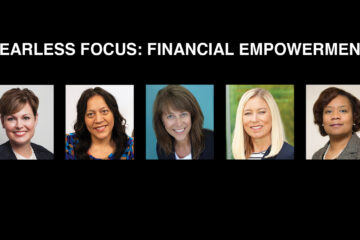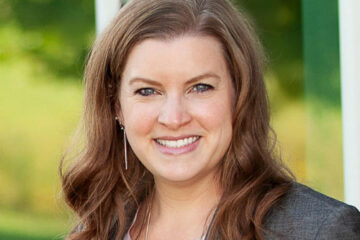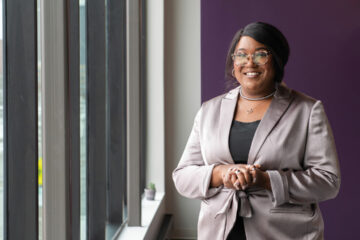By Emily Kestel
Last month the Business Record hosted its second virtual event within the Fearless Focus series. Throughout our conversation, we talked about what confidence means, what it looks like, and how to strengthen it in ourselves and others.
We talked with:
- Cheltzie Miller-Bailey – former assistant director, Center for LGBTQIA+ Student Success, Iowa State University.
- Cyndi Nelson – owner, Hawks Coffee Shop and Gypsy Soul Boutique.
- Beth Shelton – CEO, Girl Scouts of Greater Iowa.
- Gilmara Vila Nova Mitchell – director of diversity, equity and inclusion, IMT Insurance.
Below are takeaways from the conversation. Some responses have been condensed and edited for clarity.
‘It’s OK to be a work in progress’
You’d be hard-pressed to find someone who feels completely confident about themselves all of the time. Nobody’s perfect and everybody fails.
Vila Nova-Mitchell: We have to make sure young girls know that taking risks and leaving their comfort zone is fine to do. If things don’t turn out the way they expected, they can always learn from it. Perfection is one huge challenge we have when it comes to being confident. It’s OK to fail. It’s OK to take chances. It’s OK to leave your comfort zone and try something new. The results are not what matters most – it’s the journey. We have to put an expectation on young girls that life will be hard. There are a lot of times we communicate to them that everything’s going to be perfect, and it’s going to be easy and it’s going to be like what we watch on TV. We rob them of the opportunity to develop skills to navigate challenges. It’s OK to be a work in progress.
Miller Bailey: So much of knowing yourself comes from failing forward, to an extent. You don’t have to struggle to get to a place of confidence per se, but I do think that having moments where I felt unsure has helped me figure out what my values are. I’m aware of my values because of all the times that they’ve been up against a wall and I’ve had to pick between aligning with them or doing something that feels off.
Nelson: Confidence has to be something that you peck away at slowly but surely. Sometimes the journey is shorter for other people than it is for others. I absolutely hate it when everyone gets participation medals. I love it when my children fail at something – when they’re not getting to be tournament champions all the time, when they didn’t get student of the month, when they got a B on their homework assignment because they didn’t put the time in to study like Mom told them to. It teaches them that you have to work hard and you have to keep trying. Failure is a part of life. I fail every day. People criticize me all the time. I still go home and cry when [my business] gets a one-star review. I don’t want anyone to think that I’m sitting here having it all figured out. Confidence comes one step at a time, one day at a time.
Comparison is the thief of confidence
Nelson: There’s still this mindset that in order for me to be successful, that means someone else has to be unsuccessful. You say, “If I’m not the starter, I shouldn’t have confidence in myself because I’m not as good as that person.” In jobs and at work we say, “I don’t know if I can do that job as good as that person, so I don’t have as much value.” Celebrate successes and understand failures. Support your friends in their failures and successes. I remind girls that comparing themselves to others is never going to be helpful. One of the things I do for my daughter is tell her that whenever she’s on Snapchat or Instagram, she’s allowed to only take two pictures of herself, not 42 to try and find the right one. You need to be confident in the fact that that is what you look like. If you’re going to post a picture, I want it to be an authentic one of you.
Vila Nova-Mitchell: Social media has been a huge issue for young girls. When you’re starting to develop your own self-image and self-esteem, comparing yourself with other people who have very different lives can be detrimental.
Create healthy ecosystems where young girls and women can take risks and thrive
Confidence is affected by how others perceive us. When you’re in an environment that harbors comparison and judgment, you’re likely to feel less confident about yourself and your abilities.
Shelton: I had a great mentor once say to me, “When do you feel the most Beth?” Maybe those groups start off really small, maybe there’s one or two people where you feel the most yourself around. But as you gain more and more confidence, you can feel more like yourself with bigger groups. It’s important to create intentional spaces that allow people to be themselves without feeling othered or feeling compared to. The No. 1 tool that can help build confidence in young girls is through experiences where they’re stretched a little further than they’re comfortable, like riding a horse, completing a high ropes course, earning a STEM badge. They’re building that muscle of “I am capable and resilient.”
Know your values, strengths and weaknesses
Knowing what you’re good at, what you’re not good at and what you believe in helps build confidence.
Shelton: When I think about confidence, I think about having an accurate sense of self. When I’m expressing that authentically and then living authentically in those moments is when I feel confident. It’s not when I’m being the loudest or most in the spotlight. It’s when I’m being a true reflection of how I actually am.
Vila Nova-Mitchell: My definition of confidence is knowing who you are and living aligned with who you are. It doesn’t need to be loud. It can be very quiet and gentle. A very important element of confidence is humility, and understanding that you suck at some things, embracing the suck and the imperfection and feeling good about it. We all have areas to work on and we all have beautiful things to share. Understand who you are, what your strengths are and what you bring to the table. Self-awareness is a huge piece of feeling confident in who you are.
Nelson: I own two businesses, I sit on five boards in our community and I’m striving to be a part of the city council or the school board. Because I do those things, sometimes I fail in other areas. We as women are really good about feeling really crappy about ourselves when we don’t do all of the things like baking the perfect cake, packing the snacks or creating the scrapbook. It takes confidence to say, “I’m really bad at meal prepping, I’m really bad at remembering to pack my kids’ lunch, I’m really bad at getting my kids to practice on time.” My kids know it, my husband knows it, the coach knows it. Whoever is in my life understands that I have a lot on my plate and I’m doing the best I can. I have the confidence to say to people that just because I’m bad at those things, that doesn’t make me a bad mom, business owner, wife or person. I just can’t do it all. I have to put value in the things that I think are impacting my community the most, and my son showing up 15 minutes early to practice sometimes isn’t it.
Challenge societal norms and how you fit within them
Sometime, somewhere, someone conjured up a way of doing things and decided that was the “right way” of doing them. For example, some think: If you don’t wear a pantsuit or skirt to work, you’re not a professional. If you have blue hair as an adult, you’re childish. If you don’t sign your emails with “best” or “thanks,” you’re rude. If you choose to not adhere to them, you’re often othered, which can affect your confidence.
Miller-Bailey: There is this sort of unwritten, scribed set of rules that we all follow. Those norms are rooted in things like racism, sexism and classism. If you don’t fit within a certain box, it’s really hard to succeed, and that’s what shakes confidence for so many of us. Those norms are doubled, tripled or quadrupled based on how a person identifies. I think about myself growing up as a Black, queer woman in Central Iowa. I was often the only person of a color in a room. It’s incredibly hard to develop individuality even when it’s thrust upon you. … There is an idealized set of things, but why? What if we all just stopped aspiring to that concept? Perhaps that would change everything. … I want to see more people diving into their uniqueness, their individuality, and recognizing that the differences in all of us is really what makes the world a special place.
Shelton: There’s some irony in the fact that we long to fit into the norm. They’re never going to go away. We want to be in these norms and yet we celebrate those who stand out.
Don’t just hand out flowers for milestone moments
We often only celebrate and recognize people and their work when something extraordinary happens, like getting a new job, having a child, winning an award or graduating. But recognizing someone’s smaller moments and achievements helps build confidence bit by bit. These small recognitions are sometimes called “giving people flowers,” even if they’re not physical.
Miller-Bailey: Give people flowers on a day-to-day basis. Remind people of their value and your appreciation of them more often. Be clear with your feedback. Instead of just saying, “That was great,” tell them what was great about it. That helps with reassurance and lets them know that you really do value them.
Vila Nova-Mitchell: We influence each other a lot. We recognize each other’s impact on our lives. I try hard every Friday to build in reflecting time on my calendar. I reflect on the impact I have had that week and on the people that surround me. I try to communicate to others how they’ve impacted my life. I think if we all do that and lift each other up and recognize what we bring to each other’s lives, we can boost self-esteem.


